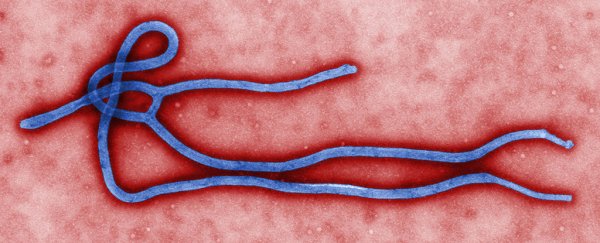A new study in mice has revealed that Ebola may not be deadly for all its victims - only for those with certain genes.
The deadly Ebola virus has so far killed more than 4,900 people, and infected more than 13,000 globally. Interestingly, some people that are infected with Ebola die quickly whereas others recover from the illness.
The varying symptoms amongst Ebola patients has confused doctors, but now, researchers have discovered that genetics may play a role in the severity of the virus.
To study the impact of genes on Ebola, researchers from the University of Washington in the US infected mice with the Ebola strain that has caused the current global outbreak. The team noticed big differences in the severity of Ebola cases in the mice, including some that showed full-blown symptoms, some who recovered, and a few that appeared resistant to the infection.
These differences, the results suggest, are being caused by the mice's genetic makeup - in particular, genes involved in activating the immune system and repairing blood vessel damage.
The findings, which are published in the journal Science, reported that 70 percent of the mice showed severe symptoms, and more than half of this group died of blood and liver problems, which are similar to haemorrhages seen in humans with the disease.
They found that the mice that died had low activity of two genes that made their blood vessels leaky, causing white blood cells, the cells that fight infection, to stream out. This caused an overblown inflammatory response that lead to cell death and destroyed organs, and eventually, death.
The team also observed that although all the mice lost weight in the first few days after infection, 19 percent made a full recovery. The mice that survived showed increased activity in the two identified genes, which are responsible for making white blood cells and repairing blood vessel damage.
The results suggest that "the genetic background of the individual who is infected plays a really significant role in determining how serious their Ebola virus disease is going to be," Angela Rasmussen, virologist and co-author of the study, told Bahar Gholipour from Huffington Post .
The researchers report that the spectrum of symptoms seen in mice mirrored the the different ways in which humans have been reacting to the virus. This suggests that the disease may also be reacting in different ways according to our genes, and Ebola survivors may have immunity to the virus.
While the study has provided some important information into the disease's mechanism, the team note that they have not accounted for environmental factors that play a huge role in the virus' effect on humans, such as quality of care and their health prior to infection. They also stated that the findings can't be applied directly to humans as, unlike lab mice, they have a large variety of genetic combinations.
The team now plans to further investigate the genes that determine susceptibility of the virus in mice, and compare these with human tissue from Ebola patients.
"We don't know what the genes are in humans," Michael Katze, microbiologist and co-author of the study, told Gina Kolata from The New York Times. "But when we find out what the genes are in mice, then we have a clue."
Sources: Huffington Post, The New York Times
